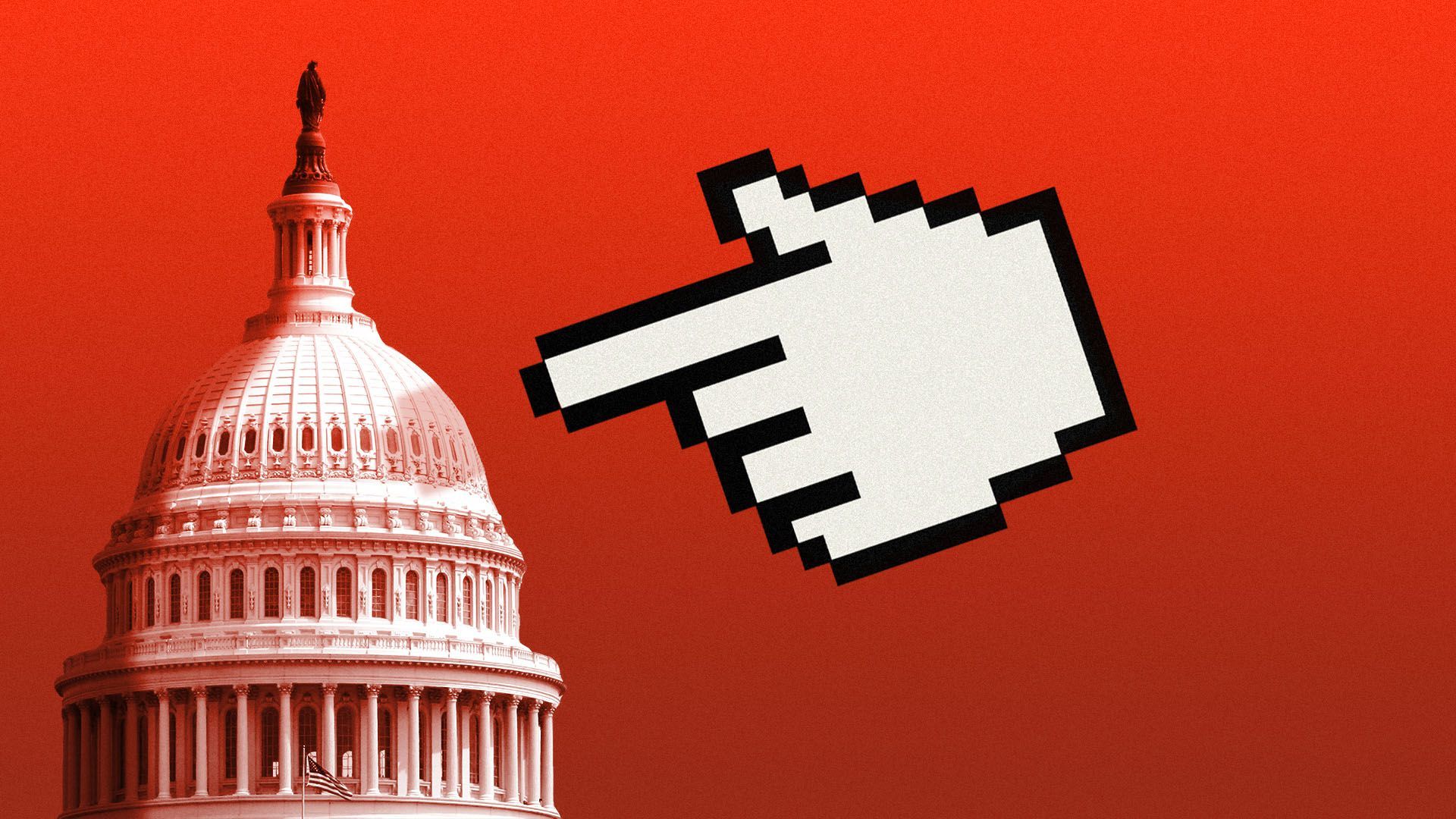For tech CEOs, Capitol Hill is now mandatory
Add Axios as your preferred source to
see more of our stories on Google.

Illustration: Sarah Grillo/Axios
Silicon Valley CEOs used to be a rare sight on Capitol Hill, but that's changing due to rising pre-election anger at Big Tech, along with a pandemic-spurred shift to video testimony.
Why it matters: The shift means Congress hears more from the CEOs of powerful companies that are shaping our world. But the hearings' partisan rancor tends to drowns out the policy debate.
Driving the news: Twitter CEO Jack Dorsey, Facebook CEO Mark Zuckerberg and Google CEO Sundar Pichai will testify this morning before the Senate Commerce Committee to talk about Section 230 of the Communications Decency Act, the much-debated law that protects them from liability when their platforms moderate content.
- Beyond Section 230, the CEOs will face questions about alleged anti-conservative bias and how they're handling election threats and controlling misinformation.
- Zuckerberg and Dorsey will then return to the hot seat Nov. 17, when the Senate Judiciary Committee will grill them over the election and the companies' moves to limit the spread of the New York Post's controversial Hunter Biden story.
Between the lines: Both committees landed the CEOs by dangling the threat of subpoenas, only days after inviting the CEOs to testify in the first place.
- It's a stark turnaround from earlier days, when committees would spend months negotiating timing and circumstances for hearings, to which companies would typically send deputies and policy experts, whom they say are better equipped to answer questions than the CEOs.
- Forcing CEOs to testify under threat of subpoena used to be a last resort for Congress, raised only if companies stonewalled — and sometimes not even then.
Flashback: The Senate Intelligence Committee left an empty chair for Google at a September 2018 hearing after the company declined to send Pichai or Alphabet CEO Larry Page.
- That hearing did, however, mark Jack Dorsey's first appearance before Congress. Mark Zuckerberg testified before Congress for the first time in April 2018.
Meanwhile: Jeff Bezos made his Capitol Hill debut this summer before the House Judiciary Committee. Tim Cook testified before Congress in 2013 over taxes before returning to the Hill to talk antitrust this summer, in that same hearing with Bezos (alongside Zuckerberg and Pichai).
Be smart: Tech hearings are scheduled around a specific policy topic, but recently they have often ended up with lawmakers leveling well-worn accusations about bias or generally expressing anger at the role of technology in society without offering specific policy proposals.
What they're saying: One tech industry official who formerly worked on Capitol Hill told Axios: "There used to be a supposition built into the discussion of [the CEOs] being busy running important companies, and being respectful of their time," the source said. "A subpoena is quite a powerful tool and not to be taken lightly."
- The intense moment in politics — along with the video format, which means no one has to fly across the country to testify — has made it easier to demand CEO testimony, the source said.
The intrigue: All this testifying may actually blunt the impact of lawmakers' would-be blows against the CEOs.
- "The companies used to push back against any hearings and now they’re monthly events. The increased frequency does take the sting out of them. The execs are better witnesses, and there’s less new ground to cover," Nu Wexler, a veteran of the policy communications teams at Twitter, Facebook and Google, told Axios.
The view from Capitol Hill: Democratic Sen. Brian Schatz plans to call tomorrow's hearing a "disgrace," according to remarks shared ahead of the hearing.
- "I have plenty of questions for the witnesses — on Section 230, on antitrust, on privacy, on antisemitism or their relationship to journalism. But we have to call this hearing what it is. It's a sham," he says in the remarks, going on to accuse his Republicans colleagues of hijacking the conversation around Section 230 in bad faith so close to the election.
The other side: Republicans say they're serious about their tech concerns.
- "We'd like to question these three CEOs because they are among the most powerful people in the country, if not the most powerful people on the planet," Sen. Roger Wicker, the Republican leading the hearing, said on Fox Business Monday.
